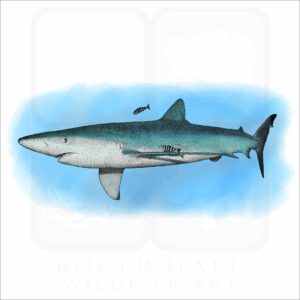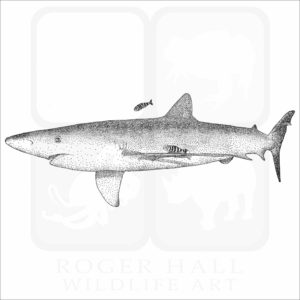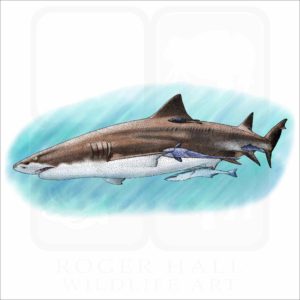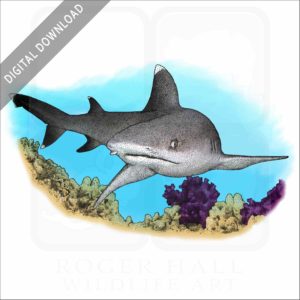Blue Shark – Signed Fine Art Print
Fine art illustration of a Blue Shark (Prionace glauca.)
The poster is printed on matte, museum-quality paper with Giclée printing quality:
• Paper thickness: 10.3 mil
• Paper weight: 5.6 oz/y² (192 g/m²)
• Opacity: 94%
Buy a Digital Download
Select options
This product has multiple variants. The options may be chosen on the product page
Lemon Shark – Signed Fine Art Print
Information about the Lemon Shark:
Lemon Sharks - so called due to the pale yellow-brown coloring - are found mainly along the subtropical and tropical parts of the Atlantic and Pacific coasts of North and South America, and in and around the Pacific Islands. They are medium-sized sharks, usually about 8 to 10 ft (3.0 m). These fish prefer warm tropical waters, and are generally found at moderate depths along the sandy bottoms or in coral reefs, but they occasionally come into the shallows to look for prey. Unlike other sharks, this species does well in captivity and is often used to study shark behavior. Lemon sharks are often accompanied by remoras. The poster is printed on matte, museum-quality paper with Giclée printing quality: • Paper thickness: 10.3 mil • Paper weight: 5.6 oz/y² (192 g/m²) • Opacity: 94% Buy a Digital Download
Select options
This product has multiple variants. The options may be chosen on the product page
Silvertip Reef Shark – Signed Fine Art Print
Information about the Silvertip Reef Shark:
The Silvertip Reef Shark is a species of requiem shark, which are typically migratory, live-bearing sharks of the warm oceans. These large predators are generally found worldwide, in patchy areas usually around coral reefs. Silvertip sharks can grow up to nearly ten feet long (3 meters) but usually measure in the area of 6 to 8 feet (2.0–2.5 meters) Like other sharks, the Silvertip feeds on bony fish, cephalopods like octopus and squid, smaller sharks and rays. While encountering one while diving can be a stressful experience, studies have shown that the sharks are usually just curious and will not normally attack humans, although attacks have been recorded, none have been fatal. Due to overfishing, especially due to the wasteful practice of catching them for sharkfin soup, this species is considered threatened. The poster is printed on matte, museum-quality paper with Giclée printing quality: • Paper thickness: 10.3 mil • Paper weight: 5.6 oz/y² (192 g/m²) • Opacity: 94% Buy a Digital Download
Select options
This product has multiple variants. The options may be chosen on the product page
Stock Art Drawing of a Whitetip Reef Shark
Medium: Pen and ink line art illustration. Color image has been digitally tinted.
Suggested usage: books, magazines, brochures and similar.
Size: (B&W) 2400 x 1461 pixels @ 300dpi 1.42 mb JPEG File / (Color) 2400 x 1499 pixels @ 300dpi 1.9 mb JPEG
Buy a Signed Print
Select options
This product has multiple variants. The options may be chosen on the product page
Whitetip Reef Shark – Signed Fine Art Print
Information about the Whitetip Reef Shark:
The Whitetip reef shark is a is a species of requiem shark and member of the family Carcharhinidae. It is the only member of its genus. It is a smalledr shark, usually not exceeding 5.2 feet (1.6 m) It name comes from the white-tipped dorsal and caudal fins. It is one of the most common sharks found on Indo-Pacific coral reefs, it can be found as far west as South Africa and as far east as Central America. It is typically found on or near the bottom in clear water. Whitetip reef sharks are rarely aggressive towards humans, though they may investigate swimmers closely. However, spear fishers are at risk of being bitten by one attempting to steal their catch. This species is caught for food, though ciguatera poisoning resulting from its consumption has been reported. The IUCN has assessed the whitetip reef shark as Near Threatened, noting its numbers are dwindling due to increasing levels of unregulated fishing activity across its range. The slow reproductive rate and limited habitat preferences of this species renders its populations vulnerable to overfishing. The poster is printed on matte, museum-quality paper with Giclée printing quality: • Paper thickness: 10.3 mil • Paper weight: 5.6 oz/y² (192 g/m²) • Opacity: 94% Buy a Digital Download
Select options
This product has multiple variants. The options may be chosen on the product page










